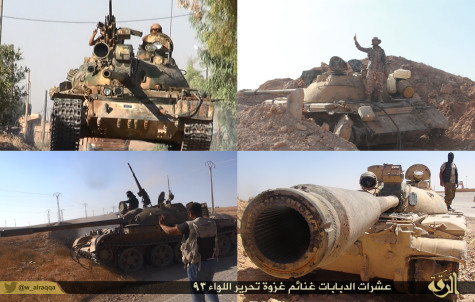An interesting alliance in Sunday’s headlines on Syria, as Western media support the Islamic State’s publicity that it is triumphing throughout the country.
The jihadists continue to celebrate this week’s capture of the Brigade 93 base near Raqqa in northern Syria, posting pictures of their haul of armored vehicles (see featured photo) and graphic images of slain regime troops.
That is to expected from the propaganda machine of the Islamic State. What may be more striking is the complementary message from outlets such as The Observer of London.
Today’s newspaper proclaims “ISIS Has Made a Remarkable, and Deadly, Comeback a Year after It Looked All But Finished in Syria and Iraq”, above an assessment by journalist Hassan Hassan:
In Syria the group has all but consolidated control of the eastern provinces of Raqqa and Deir Ezzor, as it made advances against government forces in Raqqa and subdued most of the rebel forces in Deir Ezzor. It is also advancing into Aleppo, reaching the city’s eastern outskirts, and in Hasaka, and is battling the Kurdish militias in the north-east….
Yet these advances appear to be only the tip of the iceberg. Away from the publicised gains, ISIS is quietly making progress on other fronts. Perhaps the most worrying is the fact that armed groups backed by the US have been co-opted by ISIS.
Hassan’s portrayal of the Islamic State’s advance since the spring is accurate. Yet he risks exaggeration, both in his further information and his general declaration of “First They Were Losing. Now They Are Winning.”
While some key insurgents defected to the Islamic State during the fight in the east, Hassan’s claim of mass co-optation of “armed groups” by the jihadists is a hyperbole backed by an assertion by an activist and one example from the town of Al Bukamal. Beyond Deir Ez Zor and Hasakeh Provinces, there have been no significant defections.
And while the jihadists have won other battles — for example, over a regime gasfield in Homs Province — they have not advanced in east Aleppo, positioning themselves to take over Syria’s largest city.
Even more important are the omissions from the article. The Observer pays no attention to the defeat of the Islamic State near Damascus, where insurgents have expelled the jihadists from East Ghouta after a series of clashes. The group’s incursion into Lebanese, attacking in the border town of Arsal, has ended both in its withdrawal and an insurgent backlash against it. And on the political front — far from being co-opted by the Islamic State — an insurgent bloc has been developing against the jihadists, especially in northwest Syria.
Earlier this year, Western media — befuddled by the complexities of a war without apparent end — adopted the easy declaration, “Assad is Winning”. Now, as it becomes clear that Syrian forces are not on the verge of victory, the mantra “The Islamic State is Winning” takes over.
It is unclear, when that triumph does not take hold across Syria, who will then take over the headlines. For the hard reality of the 41-month conflict is that no one is “winning” in a Patchwork War, where each side — regime, Islamic State, insurgents, Kurds — can claim some areas of control but also faces setbacks and defeats elsewhere.

